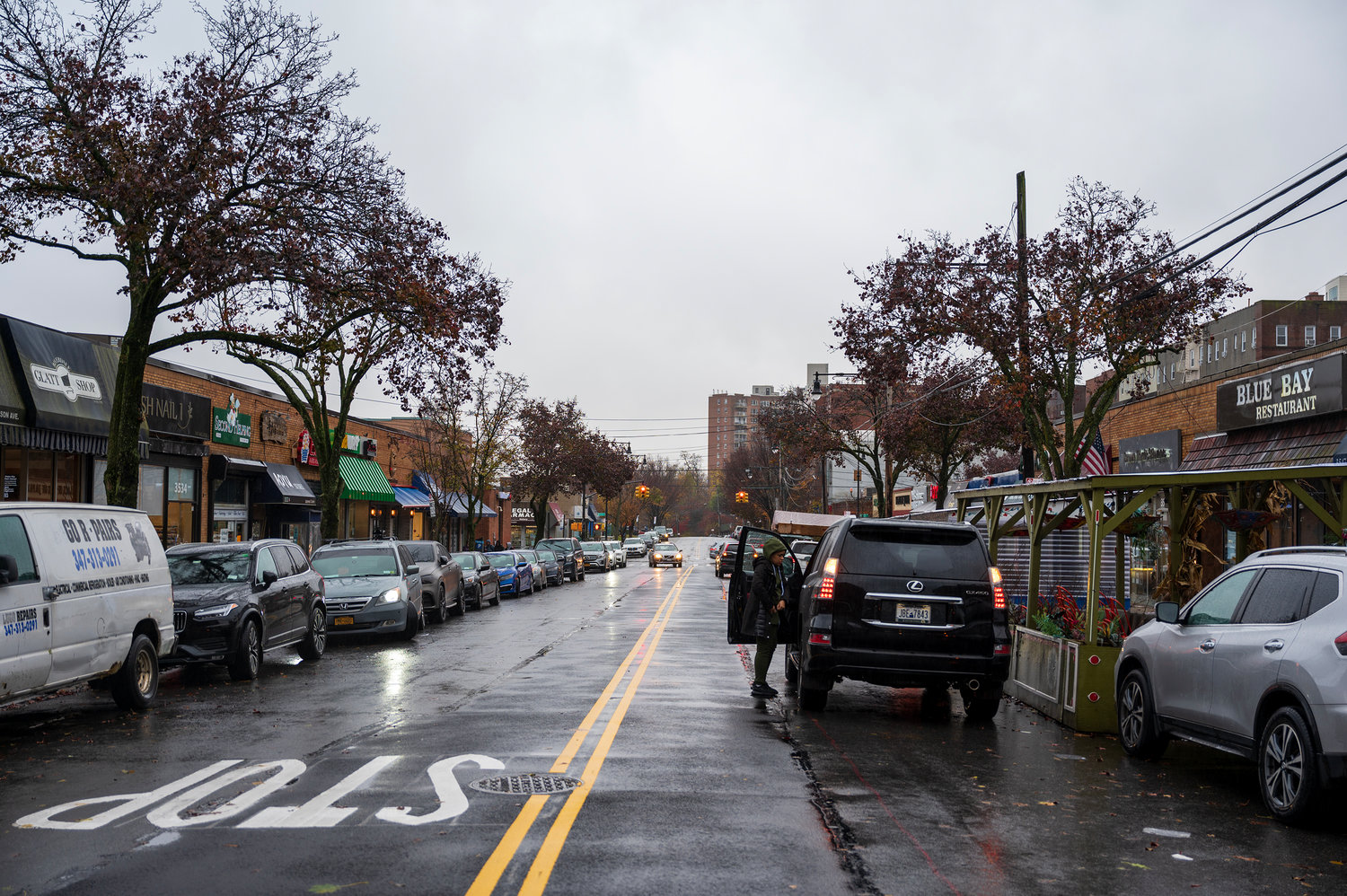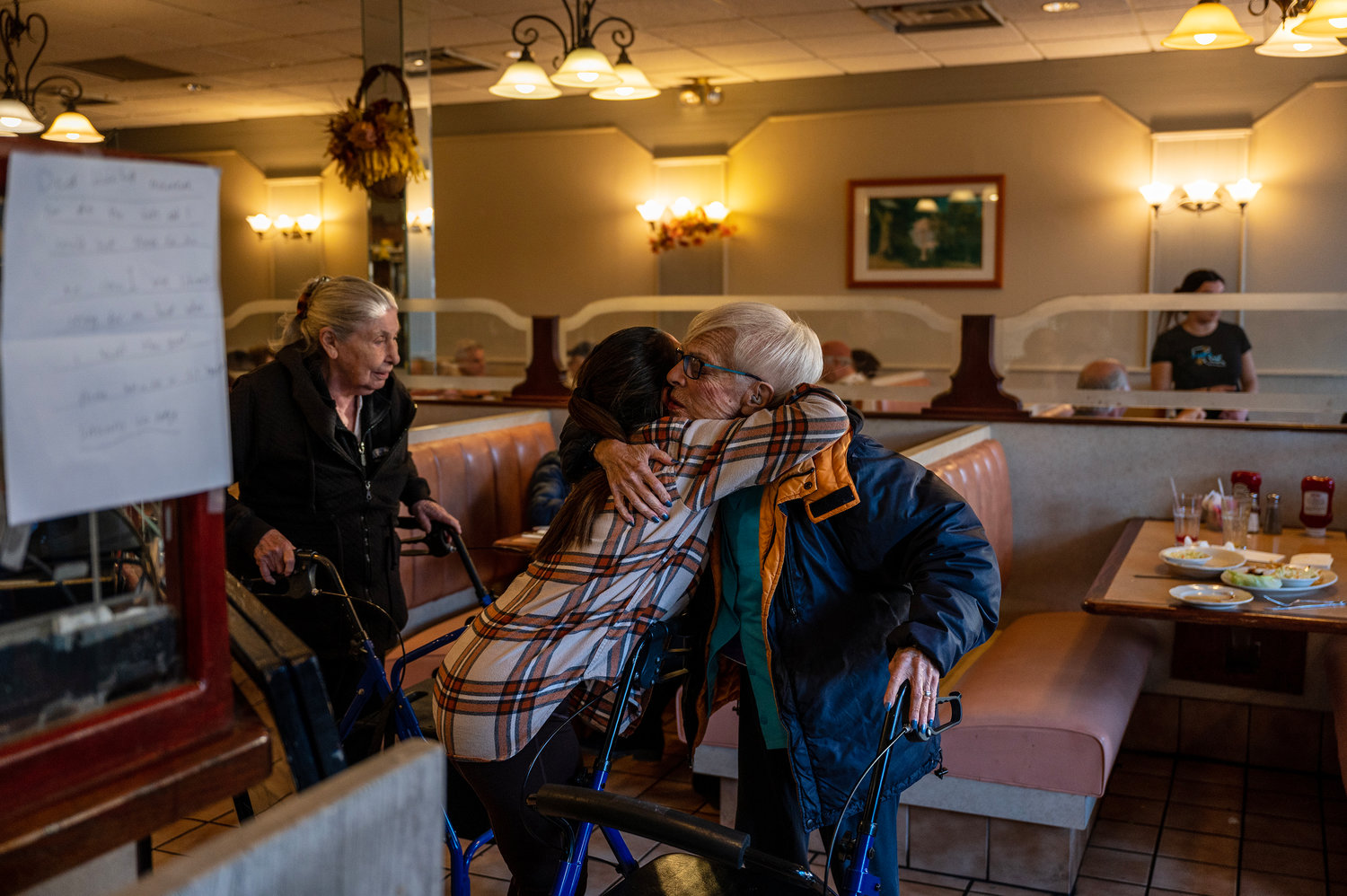With sky-high rent, small businesses face double bind
Calling ‘warehouse’ landlords’ bluff, council improves public data law
Blue Bay Restaurant has vacated its home of 48 years on Johnson Avenue, leaving just a shingled awning over a darkened storefront.
There are other patches of papered windows amid the crisscrossing paths of holiday shoppers. Two doors down at 3553 Johnson Ave., the former AT&T store has been empty for more than a year. It’s listed for $8,500 – an annual rent of $71 per square foot.
Friedland Properties, which owns the former Blue Bay property, is in no particular rush to find new tenants for its Riverdale retail units. The firm owns all 23 storefronts on the block, plus 16 across the street, and the Walgreens and CVS buildings on West 235th Street.
That’s more than half the total retail floor area between Ewen Park and West 236th Street.
The firm’s outsized control over the neighborhood’s main shopping artery has occasionally prompted pushback from Community Board 8 and local elected officials.
When Blue Bay was nearly pushed out by rent hikes 10 years ago, former New York Sen. Adriano Espaillat wrote a letter asking Friedland to back down.
And CB8 also turned up the pressure. The land use committee used every tool in its arsenal: they said they’d undertake downzoning the commercial overlays on West 235th Street, even signaled support for commercial rent regulation, a concept that has surfaced briefly from time to time in city council.
CB8 land use committee chair Charles Moerdler said Blue Bay’s final demise has been a sad re-run of events 10 years ago.
Friedland is “among the most aggressive owners in New York in terms of retail space,” Moerdler said. “I’m extremely upset with the way that they fix rents there. It’s not in the public interest, and it’s wrong.”
What goes up
must come down
When retail tenants move out and storefronts remain vacant for prolonged periods, landlords point to a number of factors. Small business owners face of maze of regulations and permitting processes in New York City that make it difficult to get off the ground. And then there’s ecommerce, which has been chipping away at local retail for over a decade.
Friedland controls some of the city’s most prestigious retail space, including several dozen Manhattan properties on Madison Avenue acquired over the last half century.
Billionaire founder Lawrence Friedland, 83, has said he wants more than anyone to fill vacant storefronts swiftly, but he’s also known to be a methodical investor. Friedland can afford to wait because the company’s holdings are so vast. They include several luxury apartment buildings and more than 100 commercial properties.
Friedland rents to Hermes and Dolce & Gabbana on gilded upper Madison Avenue, where the average asking rent was $776 per square foot in the third quarter of 2022 according to CBRE Inc.
In 2015, Bloomberg’s billionaires index estimated Friedland Properties was worth $3 billion.
In Riverdale, the firm has promoted a steady churn.
Eson Chen, the owner of Palace of Japan on Johnson Avenue, said she keeps a rosy outlook about the restaurant’s future. But the pandemic has permanently altered New York’s food and hospitality landscape, she said.
“When we closed down for three months in the beginning of COVID-19, I received a lot of phone calls from customers,” she said. “I said I’m so sorry, we’ll be back in business soon.”
At least 26,300 businesses closed permanently in New York City during the pandemic, according to Mayor Eric Adams’ economic recovery blueprint. Ninety percent of them had fewer than 10 employees, it stated.
The memory of the lockdown is still painful for Chen, but nowadays, the customers are coming back – albeit with new norms. She estimated about 60 percent of her business is take-out orders now, which would have been difficult to imagine in 1994 when Chen’s family opened Palace of Japan.
Friedland is tough, she added, but she’s putting it out of her mind as long as they still have a few years on their current lease.
“The kids are graduating from college. It’s nice to see the generation grow and the next generation comes,” she said. “You develop a feeling about this restaurant and the community. You don’t want to leave.”
High rent, high vacancy
Storefront rents in Manhattan plunged 11.1 percent in the first year of the pandemic, but a very different , story played out in the Bronx. Median storefront rent actually rose 6 percent across the borough over the same time period.
The data is part of the city’s storefront registry, created in 2019 when city council enacted Local Law 157 requiring commercial landlords to report rent and vacancy information to the city finance department.
Small businesses pushed for its passage for years in order to shed light on industry trends and build support for anti-displacement policy.
City council updated the 2019 law in September this year to improve the quality of the public database.
The Real Estate Board of New York supported the 2019 law, and the updates passed this year, while also warning against further interventions like commercial rent regulation or a vacancy tax.
“There is no incentive or benefit for an owner to keep a storefront vacant,” said REBNY vice president of government affairs Ryan Monell in a committee hearing in June this year. “Even when storefronts are vacant, property owners still must pay property taxes, as well as operating expenses such as utilities, and there are no tax benefits for keeping space empty.”
But commercial rent and vacancy trends follow unexpected patterns, which data analysts at the Association for Neighborhood and Housing Development have begun to ferret out using the new public database.
Incentives to keep rent high are a counterbalance to the revenue lost from vacant units, ANHD analysts point out.
There are specific factors that may come into play, for instance if an owner has been optimistic in presenting a lender with expected rent levels or has signed a loan agreement with specific leasing guidelines that limit their flexibility.
How it used to be
After the 2008 financial collapse, Riverdale was littered with empty storefronts.
At least a dozen businesses between West 236th Street and West 238th Street permanently shuttered, according to a Wall Street Journal report at the time.
Across the borough, retail vacancies during the recession peaked at 7.4 percent in 2010, according to an analysis of property tax filings by former city comptroller Scott Stringer’s office.
Riverdale has slowly clawed its way out over the past decade. The new wave of entrepreneurship has included neighborhood staples like Yo-Burger, Tin Marín, and Greek Express.
Some of the businesses Friedland sent packing during this time have found friendly turf nearby, like Golden Gate, which relocated from Johnson Avenue to West 231st Street in 2012, and Corner Café, which now serves vegetarian fare on Riverdale Ave.
The Johnson Avenue shops now include a number of national chain stores like Starbucks, Subway, and Dunkin’, an incursion on “the city’s irreplaceable social capital,” as Jane Jacobs first theorized.
“When I was growing up in this neighborhood, we had the welcome store, which was like our own five and dime, we had a luncheonette where we used to get egg creams,” said Jamie Katz, a third generation Riverdale resident who chatted with The Riverdale Press while waiting for an order of cheeseburger sliders at Blackstone Bar and Grill Thursday.
“We had a butcher shop, a fish shop, at one time I think four fruit stores. You ever watch ‘The Brady Bunch’, and they have Sam the Butcher? That’s how it used to be,” he said.
Abigail Nehring is a corps member with Report for America, a national service program that places journalists into local newsrooms.









